I had a wonderful time at #RWA17, the Romance Writers of America national conference. The site rotates each year, and this time it relocated to Orlando, Florida at a hotel not far from our condo there. Thus I commuted to the Dolphin Resort on a daily basis. Sessions began at 8:30 every morning, although I got there by 8:00 to cruise the goody room and see who I could run into at the conference lobby. On the left, here I am with Jane Ederlyn and Tina Stitzer. On the right, I’m with Pam Stack.


Before I get into summaries of what I learned, I want to mention that in addition to the educational aspects, networking is a prime goal of mine at these events. I was happy to see many of my fellow members from Florida Romance Writers as well as mystery author Joanna Campbell Slan from our Florida MWA chapter. Here are photos of all of us having fun. Below are Tina Stitzer, Elayne Cox, Kristin Wallace, Victoria Pinder, and Jane Ederlyn on the left. On the right is Joanna Campbell Slan, Melanie McCarthy, Zelda Benjamin and me.


Publisher booksignings meant giveaways, and I took home a collection of books to last months if not years. I only selected the ones in my favorite genres so as not to be greedy. Indie authors had their own signing event too. Signing below are Zelda Benjamin, Lynnette Hallberg, and Heather Graham.




Then there was the massive “Readers for Life” Literacy Autographing that raised $44,163.59 on behalf of ProLiteracy Worldwide and the Florida Literacy Coalition. According to ProLiteracy, the amount donated from this Literacy Autographing over the years has helped 40,000 adults learn to read.
Reading is what it’s all about, and we authors learned how to reach readers through marketing skills until it felt like steam coming out of my ears with info overload. When I’ll have time to implement any of this information is your guess as well as mine.
I especially liked the luncheons, where we could meet new people at our tables, and the mixer with librarians, booksellers, and bloggers. Individual sessions with industry reps were also helpful. In my next few posts, I’ll try to summarize the workshops to the best of my ability.
For more photos, Click Here
GIVEAWAY

Enter to win a $25 Amazon/BN gift card from Booklovers Bench.
Tag: Business of Writing
Get Started Blogging
What is a blog? And how do you start one? This past weekend, I gave a talk to a group of aspiring writers on “The Writer’s Life.” During the Q&A session, one person referred to my section on book marketing. “I don’t understand about blogs. Can you explain more about them?”

So I thought this would be a good time for a review of the principles. I’ve been blogging for over ten years. I regard it as a live journal that includes glimpses into your life such as travels, hobbies, other fun activities or musings on life in general. Plus, as a writer, you can offer tips on writing craft and marketing and share the creative process. So here are some items to consider.
Define Your Purpose.
Are you aiming to build an author platform? Do you want to be recognized as an expert in your field? To engage with readers? Or to have other writers look to you for advice? Ask yourself why you want to start a blog.
Determine Your Goals.
Do you mean to increase book sales? Gain a substantial number of followers? Attract comments on each blog? Receive requests for guest posts? What’s your benchmark of success?
Set Parameters.
How often do you intend to post? What days of the week are best? What time during the day will more people likely read your post? How long should each post be? Check your analytics as time goes on and make adjustments accordingly.
Brainstorm Topics.
While you are writing a book, jot down blog topics related to your theme, research, and writing process. These will be useful either to show your story in progress or to provide fodder for blog tours when your new release comes out. Meanwhile, determine how your content can add value to people’s lives. In what way can your personal anecdotes inspire others? Some authors set certain days for specific blog topics. For example, one day they might post recipes. Another day they might bring in a guest blogger. Or perhaps they do author interviews. Excerpts, book reviews, or trivia related to a particular hobby or personal interest might fill in other slots. I like to do conference workshop recaps. Or you can write posts as they come to you.
Acquire a Site.
When you’re ready to start, register at WordPress.com or Blogger for a free site. Or add a blog to your website. Become familiar with the features and start posting.
Link the Blog to Your Social Media Sites.
Not only should visitors be able to tweet and share each particular article, but your posts can be linked to your Twitter and Facebook pages. Check your Settings for how to enable these features or ask your Web designer to add the proper Plug-In.
What Pages Should Your Blog Site Contain?
Keep in mind that visitors to your blog, if separate from your website, might not visit you elsewhere. So consider what Pages you’ll want to have. Here are some suggestions: Welcome or Home Page; About (Bio); Appearances; Book Trailers; Books List (with series books in order); Contact (your email); Giveaways. In the sidebar, you can show your book covers, a Blog Roll with links to other authors’ sites, a Search box, a Subscribe button, Social Networking Icons, and an RSS feed button.
Include Photos in your Posts.
Photos will draw more hits, but be careful of copyright issues. Upload your own photos. Obtain photos at royalty-free sites or at least make sure you provide attribution.
Use Keywords.
Use tags with keywords and put keywords in your text to drive traffic to your site.

How to Gain Followers
- Post often. Some people set themes, like “Recipe Monday” or “Guest Blogger Wednesday” or “Photo Friday.” Be consistent in your approach and keep your material current.
- Have a clear and catchy headline for each post.
- End your posts with a question to stimulate discussion.
- Don’t use your blog solely to promote your books. You’re building a community of readers who want to get to know you, or else you are establishing yourself as an expert by offering useful material. Share new release info, reviews, and contests sparingly.
- Comment on other people’s blogs.
- Invite guests who have a following.
- Always respond to comments and respect other people’s opinions.
- On occasion, offer a prize drawing from commenters.
- If you get a lot of comments on certain types of posts, steer your blog in that direction. Be responsive to readers. Note what engenders interest and what does not.
- Be careful what you put out there. This is a public post. Avoid politics, religion, and any mention of personal business or issues you don’t want to share.
- Always be respectful of other industry professionals.
- Include links and images in your posts to raise visibility.
Index Your Blog
When your blog is a few years old, you might want to reissue an updated article. Keeping records of the topics, categories, and dates will help you retrieve these files. I suggest you write your blog in Word and save the posts by month and year. It’s imperative to keep your own blogs on your computer so you don’t lose them if there’s an online snafu. Then keep a separate file that’s an index so you can quickly search topics.
GIVEAWAYS
Goodreads Giveaway, July 6 – 20

Enter Here to win a signed ARC of Hair Brained (Bad Hair Day Mystery #14). Hairstylist Marla Vail determines to learn the truth when her best friend is hurt in a suspicious auto accident.
Booklovers Bench, July 1 – 18

Enter Here to win a $25 Amazon/BN gift card from Booklover’s Bench.
Mystery Fest Key West
Here are notes from some of the workshops I’d attended at Mystery Fest Key West in 2017. Any errors are mine due to my misinterpretation.
Friday started off with a talk by a representative from the Bomb Squad. The bomb squad in Monroe County gets about thirty calls a year. Lots of them involve old military ordinance like torpedoes and grenades, and about eighty percent are still live. Once a mortar round was dug up in a fellow’s yard and it dated back to 1887. Other finds might include acid bombs, pipe bombs, vehicle bombs, flares, and other old explosives that turn up in people’s backyards.


The investigators want to know: What is it? Why is it here? How can we disrupt it? Compressed water will tear the devices apart but won’t set them off. They have to make sure it’s safe while preserving the evidence.
When the guys respond, they keep a distance of three hundred feet or more and stay behind a protective barrier. If they have to go in closer to determine if an object is safe they’ll don helmets and flak jackets. Or they’ll send in the Robot.
The Robot is used for recon and demolition. It costs approximately $265,000 and can run up to seven miles per hour. It has six cameras, some of them encased, and it can climb stairs as well as go in and out of planes and buses. The Robot can take X-rays and can drag up to 300 pounds. It is remote-controlled at a five mile range. The machine runs on dual motorcycle batteries.
Police Myths

James O. Born spoke about police myths and how to make our law enforcement officers more realistic in our stories. He distinguished between the uniformed Highway Patrol officers and the Florida Department of Law Enforcement that’s more of an investigative agency. He spoke about pay and pensions and how patrol is the main job for a cop. They are taught to shoot in order to stop a suspect, not necessarily to kill. Deadly force would be a last resort. Plainclothes is not the same as undercover which involves deception.
I missed some of Lisa Black’s excellent talk on Blood Spatter as I had to prepare for my “Writing the Cozy Mystery” workshop coming next. Then it was time to head over to Hemingway House for an outdoor reception with drinks and appetizers.


On Saturday, Randy Rawls moderated a panel on “Where I Get My Ideas” including John H. Cunningham, David Beckwith, Charles Todd, and Paul Sinor. Next came Heather Graham moderating the interesting discussion on “How to Commit a Perfect Murder” with Lisa Black, Rick Ollerman, Robert Coburn, and Siera London. Here’s how: 1. Don’t Get Caught. 2. Is it really a murder if there’s no body? 3. Poisons have worked well throughout history, especially before modern forensics. 4. If there’s trace evidence, you will get caught. There really isn’t a right answer to this question.


Honored Guest Clifford Irving gave the keynote luncheon speech. Here he is with conference chair, Shirrel Rhoades.

I skipped the next panel, “It Takes a Crook,” to get ready for Cozy Mysteries and Female Sleuths. I moderated a panel about female sleuths where we touched upon many subjects. One of the main points that came across was that women sleuths are more intuitive and compassionate, and these stories often involve interpersonal relationships or family issues.

The evening continued with a special dinner party held at the historical Custom House Museum, which houses displays on the island’s military history.


This is always a fun conference in a relaxed atmosphere with fellow authors and fans who are eager to learn about our books.
<><><>
See all my Florida Keys Photos Here. Click on Photos and then Albums.
Sign up for my Newsletter for my latest book news, giveaways, bonus content, and events. Free book sampler for new subscribers.
Tips for the Hot Pitch
Pitching Your Novel to an Editor/Agent
Are you preparing for a conference but your knees get shaky at the thought of an editor/agent appointment? Be prepared, not scared. Begin your ten minute pitch session by offering the editor or agent a handshake along with your name. If you have a business card, hand it over. Sit down and smile and state your story’s genre and word count. Mention which imprint at the publishing house you are targeting. Then continue with the following.
Do not bring your manuscript. Do not ramble on with plot details. Do have a completed book ready to submit. Do hit these high points and then let the editor do the talking.

LOG LINE: When planning your pitch, think in terms of Key Words and Hot Premises for a one line summary of your work. Look at TV Guide for examples of log lines. Examples of key words are “humorous cozy”, “legal thriller” or “courtroom drama.” Be prepared to compare your work to movies or other authors in the same genre.
Facials Can Be Fatal: Salon owner Marla Vail’s new day spa hits a snag when a client dies during a facial in this killer cozy mystery.
Warrior Lord: A fantasy wedding in Las Vegas turns into a nightmare when contest winner Erika Sherwood realizes she’s married an alien.
CHARACTERS: Don’t crowd your pitch with too many character names. In a mystery, stick with the sleuth, victim, and killer. In a romance, just the hero and heroine count. Identify your main characters by means of an adjective and a noun. i.e. sassy hairstylist, scandalous socialite, shy schoolteacher, reckless ranger, dashing detective.
OPENING HOOK: Describe the initial set up or how the story opens.
Permed to Death: Hairstylist Marla Shore is giving her client a perm when she goes into the back room to get some clean towels. She hears a loud crash, rushes back into the salon, and finds her client dead in the shampoo chair.
Warrior Prince: Mythology student Nira Larsen receives a summer job offer she can’t refuse—to act as a tour guide for a team of warriors from another planet.
MOTIVATION: In a romance, this is the internal conflict that keeps the couple apart. In a mystery, this would be why the sleuth feels compelled to get involved.
Hanging by a Hair: Marla’s husband is implicated in the murder of their neighbor. A police detective, he’s removed from the case. She means to find the killer, clear her husband’s name, and make the neighborhood safe again.
Warrior Lord: Magnor is a Tsuran swordsman who has been shunned by his tribe. Evidence pointed his way when his brother-in-law was found murdered. He took the fall for his sister, who lied him to gain his property. He doesn’t trust women who might betray a man, nor does he consider himself worthy of love since he lost his honor.
RESOLUTION: How will your characters grow and change by the end of the story? In a romance, what compromises will each person make to bring about a HEA ending? In a mystery, what insight does the main character have about herself by the final chapter?
UNIQUENESS: How is your book different from others in the genre? What special knowledge or fresh angle do you have to offer? Does the theme deal with any issues in today’s news?
SERIES OR SINGLE TITLE: If this is meant to be a series, give the overall series title and brief blurbs for the next books. If you have an overall arc for your main character, here’s where you can mention your protagonist’s inner journey.
If the editor or agent shows interest, you can briefly mention the continuing characters that will populate your stories. In the Bad Hair Day Mysteries, these include Detective Dalton Vail, who becomes Marla’s love interest. There’s her mother and other relatives, her salon colleague Nicole, and her friends Tally and Arnie. These people are part of the world you are creating. They’ll become friends to your readers.
MARKETING: What is your series marketing hook? i.e. “It’s Murder, She Wrote in a beauty salon with a South Florida slant.”
Do you have a platform? A niche audience? How do you plan to promote the book? When I was starting out with my series, I might have said: “Besides appealing to mystery lovers who like humor and a touch of romance, I’ll target people in the beauty business such as hairstylists, manicurists, and salons owners. Plus, Florida is a popular site for mysteries. People who’ve visited here or who live here like to read about familiar places.”
Are you set up with a website, blog, Facebook page, Twitter? Are you prepared to do a virtual blog tour, book trailer, and more? Show that you’re willing to work hard as a partner in marketing your work.
SELL YOURSELF: Ultimately, it’s your energy and enthusiasm that count. You have to be someone the agent or editor wants to acquire as a client. Be professional and courteous at all times. It may even be that you speak about something else you have in common, i.e. trying new recipes or touring the city sights. Then when you send in your proposal, your cover letter can state: “I enjoyed our discussion at the XYZ conference about seafood. If you recall, I’d mentioned my book….”
Restrict your pitch to the above essentials. Avoid descriptions of plot details, physical character traits, and your own personal history unless it relates to the story.
CONCLUDING THE INTERVIEW
Thank the editor or agent for their time. If they request you send them something, ask if they want to see a query letter, proposal, or the full manuscript. Also, do they prefer an email or snail mail submission? Ask for their business card before you shake hands again and depart.
FOLLOW UP: At the editor or agent’s request, mail your work to them afterward. If it’s via snail mail, which is unusual these days, mark the package “Requested Material.” If it’s an email, be sure to put in the subject line a reference to where you met, i.e. SleuthFest Conference Author. Then cross your fingers and hope for the best!
CLICK TO TWEET
Did you miss my earlier posts on Getting an Agent? Go here for Part 1 and Part 2.
<><><>
Sign up for my Newsletter for my latest book news, giveaways, sales, and events. Free book sampler for new subscribers.
Getting an Agent – Part 2
In Getting an Agent – Part 1, we discussed how to find a literary agent. Let’s say you’ve made the connection. Here’s what to do next.
Questions to ask a potential agent
How many agents and staff work in your agency?
How many clients does the agency represent? How many clients do you handle personally?
How long have you been an agent? Are you a member of AAR?
What is your particular area of interest?
How many new authors have you sold in the past year?
What is your average response time for a completed manuscript?
Do you prefer emails or phone calls?
How long does it take for you to return a phone call or email inquiry?
How do you feel about multiple submissions?
How long do you wait after sending an editor a manuscript before following up?
Do you give your client an update on the status of their projects, or do they have to contact you?
How many rejections would it take on a manuscript before you stop marketing it?
Do you handle subsidiary rights, such as translation, foreign sales, film/TV, audio?
Do you offer a written or verbal contract?
What percentage do you charge? (15% is standard for domestic sales)
What happens if you die or are disabled?
Do you deposit money received into an escrow account for clients?
How soon do you pay clients after receiving a royalty check?
How do you keep track of submissions?
Do you submit to digital first publishers?
Do you allow an author to do indie projects separate from the work you represent?
What do you expect from your clients?
Contracts

Not all agents offer written contracts. If you do get one, be careful to read the terms before you sign. See if the agreement covers only this project or everything you write. You may request changes, such as to specify novel-length works of fiction only. If you want to do indie projects on the side, make sure the agent is agreeable and that you’re not obligated to pay him any part of this income. The agent should get paid only for rights he sells on your behalf.
Be careful of committing yourself for more than a year, and make sure you can disengage with a written notice. If you terminate, you should have no further obligation to the agent except for works which the agent has submitted or sold.
Beware of “interminable agency” or “perpetual agency” clauses in your publishing contracts. This clause grants the agent the exclusive right to represent your work for the length of the copyright. Terminology like “agency coupled with an interest” is also to be avoided. Do not commit for sequels or subsequent works or the length of your copyright. Also examine the clause an agent puts into a publishing contract when the time comes. Some of the professional writing organizations have sample contracts online, so get involved in the writing community and ask experienced authors your questions after you’ve done your own research.
How to tell if your agent isn’t working out

A. You never hear from him.
B. He doesn’t answer your calls or emails.
C. You don’t receive copies of rejection letters if you’ve requested them.
D. The agent turns down your new ideas.
E. He claims to be busy with more important clients.
F. You find out he never submitted your manuscript to an editor as promised.
How to switch agents
Send your current agent a letter or email and say your relationship isn’t working out as desired, and you wish to move in a new direction. Thus you are terminating your agreement. Keep a printed copy of his acknowledgment. Keep in mind that you remain under obligation to this agent for any work he has submitted or sold for you. To be clear on the termination terms, check your agency agreement. Once you are free from your previous relationship, you can seek a new agent.
Author/Agent Etiquette

- Be prepared to suggest markets to an agent to show you are savvy about the business and have done your research. It’s hard to keep up with all the changes in the publishing industry. Consider your relationship as a business partnership where you each contribute.
- Don’t accost an agent in the restroom at a conference or if they are in a deep discussion with another author.
- Leave your manuscript at home. If an agent agrees to see your work, follow up with an email and ask for his submission requirements. Remind him where you met.
- Don’t hound your agent. Responses from editors can take months. If you need someone to hold your hand, join a critique group. Remember that you are not the agent’s only client.
- Always be courteous and professional. Keep producing new work at a steady pace. Listen to your agent’s suggestions even if you agree to disagree. Maintain a social media presence and keep up to date on industry news.
CLICK TO TWEET
Coming Next: Tips for the Hot Pitch
<><><>
Sign up for my Newsletter for my latest book news, giveaways, sales, and events. Free book sampler for new subscribers.
Getting an Agent – Part 1
How do you get a literary agent? Here are some tips to start your journey from writer to published author. First, complete your manuscript in the proper format. Look online at literary agent sites for submission requirements.
Where do you find an agent? Sign up for writers’ conferences with editor/agent appointments. If your group runs a local event, volunteer for the editor/agent committee. Enter writing contests where agents are the final judges. Note the acknowledgments to agents in books by your favorite authors to find people who represent your genre. Search the Guide to Literary Agents or Writer’s Market at your local library.
Follow agents on Twitter. Look for the hashtag #MSWL (manuscript wish list). You can get more specific for a particular genre (i.e. #MSWL Mystery). Also check out #Pitchmas, #AdPit, #Pit2Pub, #PitMad, #AgentsDay, #Carinapitch, #PitMatch for online pitches. Also use #AskAgent if you want to find agents who might be interested your story. Here are some places that might hold online pitch sessions:
http://cupidslitconnection.blogspot.com/
http://www.savvyauthors.com
http://www.brenda-drake.com/pitmad/
http://www.soyouthinkyoucanwrite.com/
Also follow blogs by well-known agents and publishing industry professionals. You’ll learn who these people are by getting involved in the writing community.
Do Your Research
http://aaronline.org/
http://absolutewrite.com/forums/activity.php
http://accrispin.blogspot.com/
http://www.agentresearch.com
http://www.agentquery.com
http://www.literarymarketplace.com/
http://www.manuscriptwishlist.com/
http://mswishlist.com/
http://www.publishersmarketplace.com
http://www.querytracker.net
http://www.sfwa.org/other-resources/for-authors/writer-beware/alerts/
http://www.writersmarket.com/
http://www.1000literaryagents.com/
Follow the guidelines for submissions on the agent’s website. Write a snappy query letter introducing yourself, giving the word count and genre for your book, your writing credits, and a few sentences about your story. Make it read like back cover copy. Include a hot premise or marketing hook that makes your story stand out. This letter should be no longer than one page. DO NOT describe your life history or any personal details that do not relate to your writing career. DO include if you belong to a critique group, have won writing contests, or if you’ve attended writing workshops and conferences.
If you hear nothing for a couple of months, send a follow-up email to ask if the agent received your query. Be courteous and respectful of the agent’s time. Be aware that some agents won’t respond at all, and this can be taken as a rejection. But follow through at least once to make sure your email was received. As an alternative, you can request a return receipt for when the agent opens the mail.
If you receive a rejection letter with detailed suggestions for your work, write a thank you note. Remember, an author-agent relationship is a two-way street. Just as you want to hire the ideal agent, the agent wants to land the ideal client. Be courteous, professional, and savvy about the industry. Never pay an agent any fees. The agent will receive a commission on sales.
CLICK TO TWEET
Coming Next: Getting an Agent – Part 2
You’ve found an agent who interests you. Now what?
How Not to Request a Book Review
Occasionally, I’ll get requests from authors to review their books. Some of these I’ve accepted, but mostly I send a polite refusal. Here are some examples of what not to do when approaching an author, especially when you don’t know her personally. This also applies to guest blog posts.

Dear Nancy J. Cohen,
I noticed your review on Amazon for “Murder at the Seaside.” My book is a suspense novel set in Phoenix. It’s a bit outside the cozy genre, but the language is clean and amusing. Would you be willing to read my book and give an honest review?
[When they start with my full name like this, I know they are unfamiliar to me. This book is outside my genre, and the author is an unknown who got my name off Amazon. No deal.]
Dear Ms. Cohen,
I would love to have you interview me on your blog for my upcoming romantic comedy due for release from XYZ Publishing. See back cover blurb below. Please let me know what other information you need to consider reviewing it.
[Is this person requesting a review or a guest blog spot? Either way, her book isn’t my genre, and the author is unknown to me. I’m not interested.]
Dear Nancy,
I’ve finished my first medical thriller and would be honored if I can get a blurb from you. I love your romantic suspense novels. They keep me at the edge of my seat. I’ve really enjoyed reading Hair Raiser and hope to read more of your work.
[This would be a polite, No Thanks. I write mysteries, not romantic suspense. And this person says “they” keep her on the edge of her seat, but she’s only read one. Thrillers are outside my genre, and while occasionally I do read them, I’d rather not be obligated here.]
Hello Nancy J. Cohen,
I saw that you reviewed“The Stolen Queen.” My book has similar elements but more romance and intrigue. [Story Blurb follows]. This romantic adventure is so thrilling and unlike anything you’ve ever read, you’ll be hooked until the last page. My novel is a spine-tingling adventure with exciting twists & turns.
[Bragging about how your book is a bestseller or how it’ll hook my interest is a turnoff.]
Dear Nancy,
I saw that you reviewed the Alex Rider story, “Stormbreaker.” I am author of a middle grade fantasy titled “The Secret of the Oracle.” In this time-travel adventure, Eddie must overcome his fears and battle evil forces in ancient Greece to discover the identity of a sorcerer. Would you like to receive a complimentary digital copy of my book?
[I accepted this one. YA Fantasy is a genre I like to read, and the story line intrigued me. The author didn’t make any braggart claims about how his story will blow me away. He was polite and concise in his request. I enjoyed this book and gave it an honest review.]
Hello,
I have a new release coming out titled “Murder in the Garden,” and I am organizing a book tour. I will provide excerpts and interviews. I’ll be running a Rafflecopter contest, and if you’d like to participate, I’ll include your social media links. (Story blurb follows)
[I accepted this one and was happy to help a fellow mystery author. Why? Not much to do on my part except schedule a blog post on the set day. It’s the appropriate cozy genre. And I’d get social media links in her Rafflecopter. She sounds savvy and will likely show up on the blog to answer comments. This person made things easy.]
<><><>
My Advice
· Request a review from an author who writes in the same genre or who clearly enjoys reading the type of book you’ve written.
· Mention a deadline if you have one for the review.
· Be gracious and accepting that the author might not have the time or interest.
· If you’re proposing a blog post, study the type of posts on the host’s blog and then suggest several relevant topics. Also note, while on her site, if she even hosts guests or has a submission policy.
· Be modest. Don’t make braggart claims about how your book is a bestseller, will keep readers riveted until the end, or is a laugh-out-loud funny story. Readers can judge these things for themselves.
· Mention your website or the Amazon page for your book so the author can find more information there.
· If the author declines your offer, thank her politely for her consideration.
Note that a book review request differs from an endorsement request. What else would you add to this list?
SleuthFest 2017 Recap
SleuthFest 2017 was another stellar event held at the Embassy Suites in Boca Raton. This premier mystery writers’ conference is sponsored by the Florida Chapter of Mystery Writers of America. Third Degree Thursday kicked off the weekend with a bunch of workshops and Dirk Wyle’s Readers’ Corner. That evening, co-chairs Victoria Landis and Joanne Sinchuk welcomed everyone to the conference. We heard publisher Neil Nyren discuss the state of the industry and agents in particular. Then those folks who had signed up attended the “Sleuthfest 101” dinner followed by a trivia contest.


Friday morning, I attended a workshop by publicist Maryglenn McCombs titled Seven Secrets to Promoting a Book. Then I moderated a panel on How to Keep a Series from Getting Stale with authors Lynnette Hallberg, Cheryl Hollon, Carol J. Perry, and Nancy G. West. Using different settings, interesting research, new characters, evolving relationships, and character arcs were some of the techniques mentioned.


Lunch in the ballroom followed with a talk by our Forensic Guest of Honor, Dr. Vincent DiMaio. His graphic slides made swallowing our meal difficult but his talk was fascinating. He spoke about cases that appeared to be natural deaths or accidents, but upon closer examination, proved to be murder.


Another round of workshops followed. Next came my own presentation on Preparing for Your Book Launch. I spoke about the various ways writers can publicize a new book release.
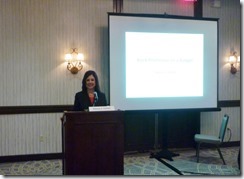
The banquet on Friday evening included the Freddie Awards Ceremony. The winner in the Mystery category was Graham Reed from Vancouver for his entry, The Chairman’s Toys. The winner of the Thriller category was Millie Naylor Hast from Texas for her entry, Takeover.
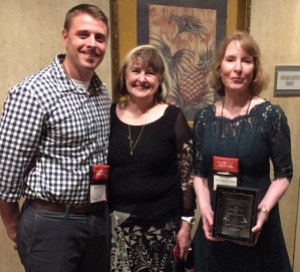
Saturday morning found us back attending workshops. I moderated the one titled Crime Solving Couples with speakers Carol J. Perry and Nancy G. West. The three of us spoke about how the couples work together in our respective series.
Luncheon brought us Keynote Speaker and Bestselling Author David Baldacci, who entertained and educated us while we ate. He’s a great speaker, and I couldn’t wait to read his book “The Finisher” that I’d bought in the on-site bookstore run by Murder on the Beach Mystery Bookstore.
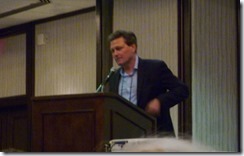
Then former chapter president Randy Rawls presented the Flamingo Award to the very deserving Rick Wymer, who with his wife Mary Lou, have spent hours of selfless devotion as volunteers in the service of FMWA.
At this point, I’m sorry to say, I went upstairs to my hotel room to rest. I’d contracted a cold and sinus infection at the end of the FRW conference cruise, and I was getting worse instead of better. But I made it to the cocktail party that evening and had a nice chat with fellow authors. Still not feeling well, I cut out early on Sunday morning and had to miss our Sunday Guest of Honor, Jeff Lindsay. I’ve heard he was a great speaker and very entertaining.
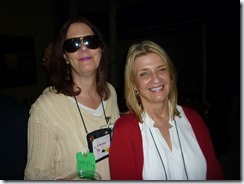


And so now we must begin to plan for next year. Go Here to see more photos.
How to Sell More Books
At the Florida Romance Writers Cruise Conference, Penny C. Sansevieri spoke about how to sell more books by optimizing your book description on Amazon.

Penny suggests your book should be available in as many formats as possible, including ebook, print book, audio, bundle sets, and spin-off series. You can offer your superfans exclusive content, such as cut chapters, behind-the-scenes details, or sneak peeks at works in progress.
Keep telling readers why their reviews are so important. Put a message about reviews right after the story ends and before the rest of the back materials. Offer incentives, such as “The first 50 readers to review the book get a logo tote bag.” Or, say that the price to get into your exclusive reader group is a review.
Make sure your website is professional and updated often.
Amazon algorithms work on categories, search terms, and reviews. Pay attention to the keywords in your book’s description. These keywords and the book categories are your metadata.
Try http://Ubersuggest.org as a keyword tool. Narrow your category to stand out. Better a niche category than a broad one.
The lower your Amazon sales rank, the better your sales. Sales ranks vary by category. On your Amazon book page, look at the sales ranks for categories and see which numbers are lower. Don’t look at recent releases.
Find fifteen keyword strings. Look for keywords in reviews. Use these as keyword strings and in your book description. Themes can also be used as keywords. Add the keywords to your website metadata.
Where to Use Keywords: Title, Subtitle, Book Description, and at your KDP Dashboard.
Write to Amazon Author Central to make changes regarding data on your publisher-uploaded books. Make sure your print and ebook categories match along with the book descriptions.
The search rank improves when a print copy is available. It doesn’t matter if this print edition sells or not. Also, it’s better not to upload the print and ebook at the same time. Let there be a short interval between releases.
In the Amazon book description, you can use Bold, Italics, and Bullets. Don’t have a big block of information. Keep paragraphs short at two or three sentences maximum. The first sentence should be a headliner to grab attention and can be bolded. Don’t use caps. Spell check your work. Mention the book is part of a series. Include review quotes with proper attribution.
Update your book page with awards and review blurbs. Mention special discounts or book promos.
Make sure your bio complements your book. It should relate to your writing credentials or the book’s topic.
If you have a choice, don’t do your description update in Amazon Author Central because it’s shorter than the one in KDP.
Don’t do ebook promos until you have at least 10 reviews. If you do a Kindle giveaway, start with 3 days and not all 5 at once. After your campaign ends, keep the book at half price for at least a day more.
Don’t put “bestseller” on your Amazon book title unless you are prepared to verify this claim.
The shorter the pre-order period, the better. Lower your book price at launch to garner reviews and to attract impulse buyers.
Disclaimer: Any errors are due to my misinterpretation.
For more information, visit AMarketingExpert.com
CLICK TO TWEET
Coming Next: Sleuthfest 2017 Review
Book Promotion Secrets
At SleuthFest, we heard publicist Maryglenn McCombs speak on Seven Secrets to Promoting a Book.
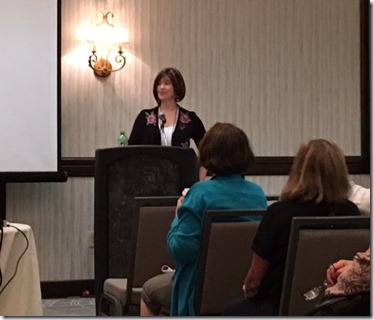
Timing is everything. Coordinate your publicity around the release date. Target holidays if your book has a holiday theme. Ditto for a historical angle. Start your launch campaign at least three months prior to release. Don’t have media coverage or reviews posted until the book is available. Trade media that serves bookstores and libraries is the exception.
Brevity in a short synopsis is an important tool. The synopsis is your book’s advertisement. It should be similar to book jacket copy to entice readers. Write three different lengths: 175 words or less, 100 words or less, and 50 words or less. Create a one-liner soundbite.
A stellar press kit can help you stand out. You need advance reading copies (ARCs) in print and digital formats. Have low and high resolution author photos. Get a professional headshot taken. Make sure your website is polished. Write a press release and a one-page sale sheet that tells about your book and mentions any endorsements. You can include a sample author interview. Have a biography written in third person. Tell where your books can be found but don’t mention specific vendors (i.e. at most major online retailers).
“If you fail to plan, you plan to fail.” Identify your target readers. How can you reach them? Three months before release, send ARCs to the trade media. Contact syndicated reviewers, radio/TV media. Plan signings and launch party 6 to 8 weeks ahead. Look at smaller, local media and online venues. “Promotion is a marathon and not a sprint.”
What works?
· Print Media.
· In-person launch parties.
· Steady media coverage.
· Book awards.
· Big endorsements.
· “Best-of” lists.
· Gift guides.
What doesn’t work?
· Radio tours.
· Lengthy book tours.
· Social media caveman tactics.
· Book trailers.
· Mass mailings.
· Asking buyers to review your book.
· Gimmicky promos.
Find people who will review your books. Look at local news sources, community groups where you belong, school alumni, work resources, places related to the book’s setting. See who’s reviewed books similar to yours.
Be polite and persistent when pitching your book. Follow review policies. Never ask for a copy of the review because that shows you don’t follow their publication. Don’t make outlandish comparisons of your work to others.
The most important part of a media campaign is the book. Get a professional, eye-catching cover design. And write the best book you can.
Disclaimer: Any errors are due to my misinterpretation.
For more information, visit Maryglenn.com
CLICK TO TWEET
